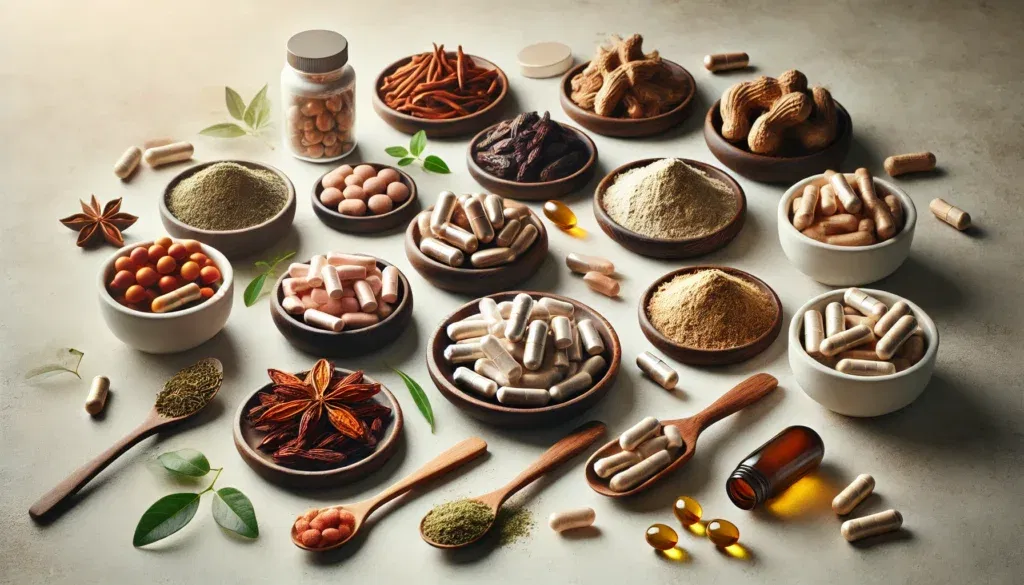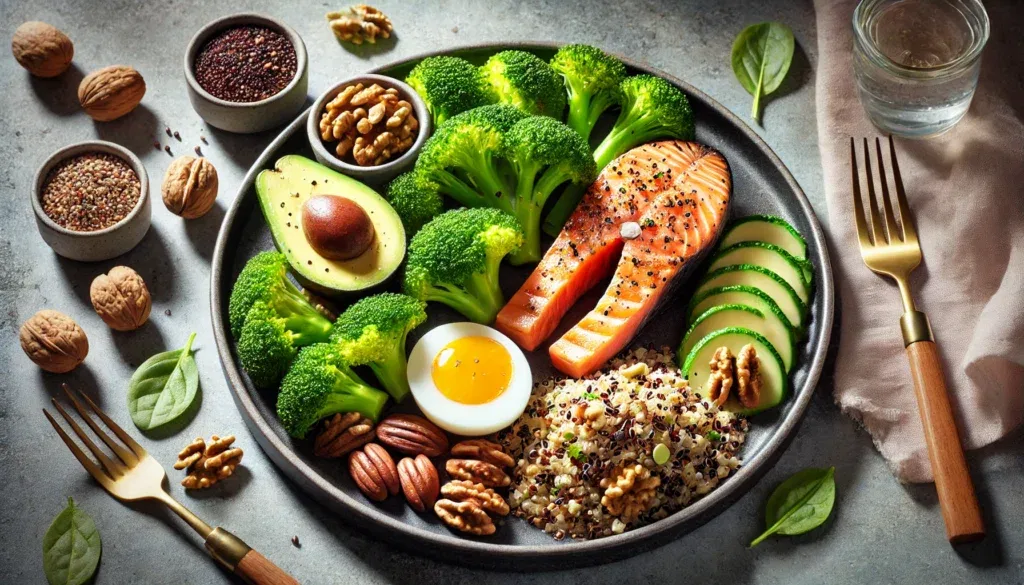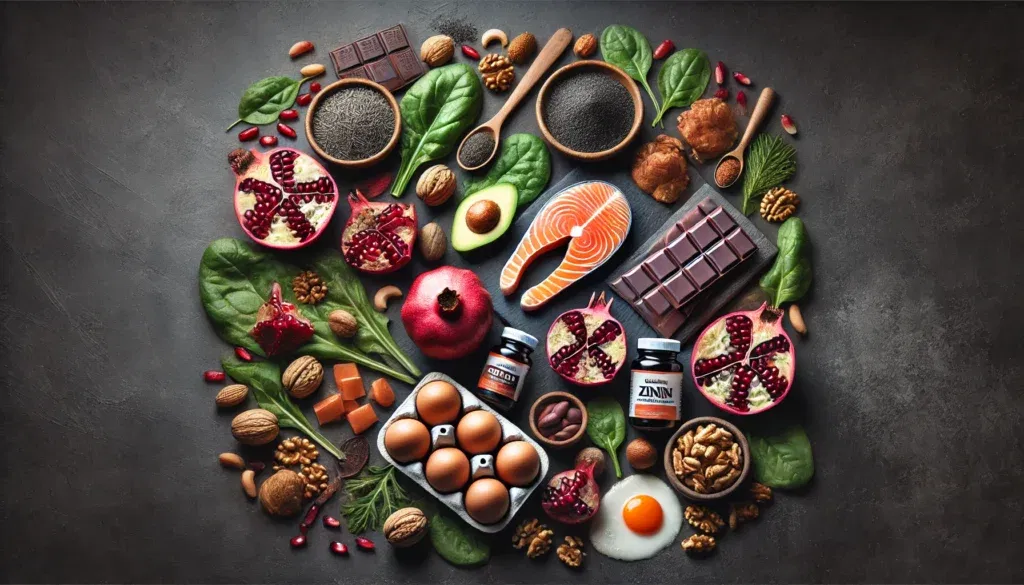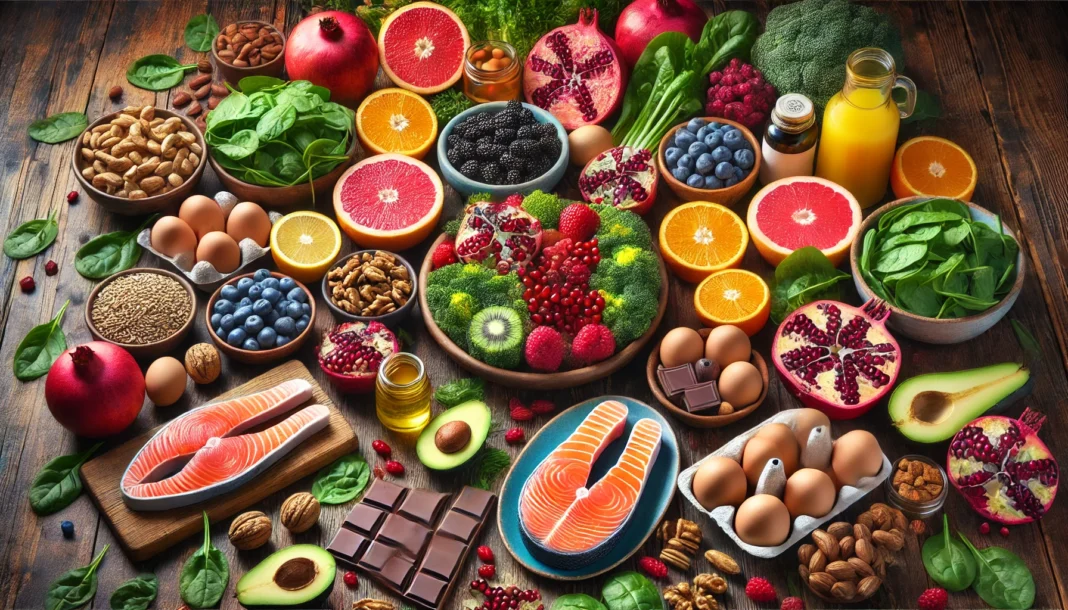Understanding the Importance of Testicular Health
Testicular health plays a critical role in male reproductive function, hormone balance, and overall well-being. The testicles are responsible for producing testosterone, the primary male sex hormone, and sperm, which are essential for fertility. Maintaining optimal testicular function requires a combination of a balanced diet, regular physical activity, and appropriate supplementation. Factors such as oxidative stress, inflammation, and poor lifestyle choices can negatively impact testicular health, leading to hormonal imbalances and reduced fertility. Scientific research highlights various foods and supplements that support testicular function, enhancing testosterone production and sperm quality. By incorporating these proven dietary strategies, men can optimize their reproductive health and maintain robust hormonal balance.
You may also like: How to Increase Testosterone Levels Naturally: Science-Backed Strategies for Men’s Health & Longevity
Best Foods for Testicular Health
A nutrient-rich diet is fundamental to testicular health, with specific foods providing essential vitamins, minerals, and antioxidants that support hormone production and reproductive function. Incorporating these foods into daily meals can significantly improve testicular function and overall well-being.
1. Cruciferous Vegetables and Their Role in Hormone Balance
Cruciferous vegetables such as broccoli, cauliflower, Brussels sprouts, and kale contain compounds that promote healthy testosterone levels. These vegetables are rich in indole-3-carbinol and diindolylmethane (DIM), which aid in estrogen metabolism, ensuring that excess estrogen does not suppress testosterone production. Additionally, cruciferous vegetables provide powerful antioxidants that reduce oxidative stress, which can damage testicular cells. Studies indicate that men who consume these vegetables regularly have a more favorable testosterone-to-estrogen ratio, leading to improved reproductive health. Including cruciferous vegetables in the diet supports hormonal balance and protects against testicular oxidative damage.
2. Oysters and Zinc-Rich Foods for Testosterone Production
Oysters are one of the richest dietary sources of zinc, a mineral essential for testosterone synthesis and sperm production. Zinc deficiency has been linked to low testosterone levels and impaired sperm quality, making it crucial for testicular health. Other zinc-rich foods include red meat, poultry, pumpkin seeds, and lentils. Zinc not only supports hormonal balance but also enhances sperm motility and morphology, factors critical for fertility. Consuming adequate amounts of zinc through diet or supplementation helps prevent testicular dysfunction and supports optimal reproductive performance.
3. Fatty Fish and Omega-3 Fatty Acids for Sperm Quality
Fatty fish such as salmon, mackerel, and sardines provide omega-3 fatty acids, which are crucial for reducing inflammation and improving sperm health. Omega-3s help maintain the fluidity of sperm cell membranes, enhancing motility and function. Research suggests that men with higher omega-3 intake have better sperm morphology and reduced oxidative stress in their reproductive organs. Omega-3s also play a role in regulating testicular function by supporting Leydig cells, which produce testosterone. Incorporating fatty fish into the diet or supplementing with high-quality fish oil can significantly improve testicular health.
4. Nuts and Seeds for Essential Micronutrients
Nuts and seeds, particularly walnuts, almonds, Brazil nuts, and flaxseeds, provide key micronutrients such as selenium, vitamin E, and magnesium. Selenium is essential for sperm production and reduces DNA fragmentation in sperm cells. Brazil nuts are an excellent source of selenium, with just a few nuts providing the recommended daily intake. Vitamin E, found in almonds and sunflower seeds, acts as a powerful antioxidant that protects sperm from oxidative damage. Magnesium plays a role in testosterone synthesis and supports overall testicular function. Regular consumption of these nutrient-dense foods contributes to optimal reproductive health.
5. Dark Chocolate and Antioxidants for Sperm Motility
Dark chocolate contains high levels of flavonoids and antioxidants, which help reduce oxidative stress in the testicles. The presence of L-arginine in dark chocolate has been linked to improved sperm count and motility. Flavonoids in cocoa support blood flow to the testicles, ensuring optimal nutrient delivery for hormone production. Choosing dark chocolate with a high cocoa content (70% or more) maximizes the intake of beneficial compounds while minimizing sugar intake. Moderate consumption of dark chocolate can be a delicious and effective way to enhance testicular health.

Proven Supplements for Testicular Growth and Function
In addition to a nutrient-rich diet, certain supplements can further support testicular health, promoting testosterone production and enhancing fertility. These supplements have been backed by scientific research and are widely recognized for their effectiveness in improving reproductive function.
1. Vitamin D and Its Role in Testosterone Synthesis
Vitamin D plays a crucial role in male reproductive health, with research showing a strong correlation between vitamin D levels and testosterone production. Men with low vitamin D levels often experience reduced testosterone, leading to symptoms such as fatigue, low libido, and poor sperm quality. Sunlight exposure is the best natural source of vitamin D, but supplementation is often necessary, especially in individuals with limited sun exposure. Studies indicate that vitamin D supplementation can lead to increased testosterone levels and improved sperm parameters. Ensuring adequate vitamin D intake is essential for maintaining optimal testicular function.
2. Ashwagandha for Hormone Balance and Fertility
Ashwagandha, an adaptogenic herb, has been extensively studied for its effects on male fertility and testosterone production. Research suggests that ashwagandha supplementation increases testosterone levels, enhances sperm count, and improves sperm motility. The herb works by reducing cortisol, the stress hormone that can negatively impact testosterone synthesis. Ashwagandha also supports overall reproductive health by increasing antioxidant levels in the testicles, protecting sperm from oxidative damage. Regular supplementation with ashwagandha is a natural and effective way to support testicular health and hormone balance.
3. Fenugreek for Boosting Testosterone Levels
Fenugreek is a popular herbal supplement known for its ability to enhance testosterone production and improve libido. Studies have demonstrated that fenugreek supplementation increases free testosterone levels while reducing the conversion of testosterone to estrogen. The active compounds in fenugreek, such as saponins and furostanolic saponins, contribute to its hormone-boosting effects. Additionally, fenugreek improves insulin sensitivity, which is important for maintaining healthy testosterone levels. Including fenugreek in the diet or taking a standardized supplement can significantly benefit testicular health.
4. Coenzyme Q10 for Sperm Health
Coenzyme Q10 (CoQ10) is a powerful antioxidant that plays a crucial role in mitochondrial function and energy production in sperm cells. Research indicates that CoQ10 supplementation improves sperm count, motility, and morphology by reducing oxidative stress in the reproductive system. Since sperm require high levels of energy to function optimally, CoQ10 helps enhance their viability and fertilization potential. Men seeking to improve their fertility may benefit from incorporating CoQ10 into their supplement regimen.
5. Magnesium for Testosterone Support
Magnesium is essential for testosterone synthesis and overall male reproductive health. Studies show that magnesium supplementation increases free and total testosterone levels, particularly in active individuals. Magnesium also plays a role in reducing inflammation and supporting muscle function, which indirectly contributes to hormone balance. Dietary sources of magnesium include leafy greens, nuts, and seeds, but supplementation can be beneficial for those with inadequate intake. Ensuring optimal magnesium levels is a key component of maintaining testicular health.

Frequently Asked Questions (FAQ) on Testicular Health
1. What are the best foods for testicular health?
A diet rich in antioxidants, healthy fats, and essential vitamins plays a crucial role in maintaining testicular health. Some of the best foods for testicular health include avocados, which are rich in healthy fats and vitamin E, and oysters, which provide high levels of zinc, a mineral essential for testosterone production. Dark leafy greens like spinach supply folate, which is vital for sperm health, while nuts and seeds offer selenium, a powerful antioxidant that protects testicular cells. Additionally, fatty fish such as salmon and mackerel contribute omega-3 fatty acids that reduce inflammation and support hormone balance. Regular consumption of these foods for testicular health can lead to improved function and fertility over time.
2. Are there proven supplements for testicular growth?
Yes, several scientifically backed supplements can support testicular health and potentially promote growth. Zinc and vitamin D are two of the most researched nutrients for their role in testosterone production and testicular function. Additionally, L-carnitine, an amino acid found in red meat and dairy, has been shown to enhance sperm motility and energy production in testicular cells. Ashwagandha, an adaptogenic herb, may aid in reducing stress-related testosterone decline while promoting testicular size and sperm count. Supplementing with CoQ10 can also be beneficial as it improves cellular energy and acts as a potent antioxidant. When looking for supplements for testicular health, choosing high-quality, bioavailable forms ensures maximum effectiveness.
3. How do lifestyle choices impact testicular health?
Lifestyle factors play a significant role in testicular function and overall reproductive health. Chronic stress can elevate cortisol levels, negatively affecting testosterone production and sperm quality. Poor sleep patterns disrupt hormonal regulation, while excessive alcohol intake can impair testicular function and shrink testicle size over time. Regular exercise, particularly resistance training, helps boost testosterone levels and improve circulation to the testicles. Additionally, avoiding prolonged heat exposure, such as frequent hot baths or tight clothing, can protect sperm health. Incorporating the best foods for testicular health and avoiding harmful habits ensures long-term well-being.
4. Which supplements for testicles improve sperm quality?
Several supplements for testicles are known to enhance sperm health and motility. Vitamin C is a powerful antioxidant that reduces sperm DNA damage and oxidative stress. Selenium, found in nuts and seafood, plays a vital role in sperm morphology and function. Folate and zinc work together to improve sperm production and reduce abnormal sperm formation. Omega-3 fatty acids found in fish oil supplements can enhance sperm fluidity and improve overall reproductive health. Lastly, maca root has been traditionally used to boost sperm count and mobility, making it a valuable addition to a supplement regimen.
5. Can diet alone improve testosterone levels?
While diet is a fundamental factor, it is often most effective when combined with other lifestyle changes. Consuming the best foods for testicular health, such as eggs (rich in vitamin D and healthy fats), pomegranates (which reduce oxidative stress), and lean meats (for adequate protein intake), supports hormonal balance. However, maintaining optimal testosterone levels also requires regular physical activity, stress management, and sufficient sleep. Certain supplements for testicular health, like magnesium and boron, can further enhance testosterone production when dietary intake is insufficient. Combining a well-balanced diet with lifestyle modifications maximizes the benefits for hormonal health.
6. What are the best vitamins for testicular health?
Several essential vitamins contribute to testicular function and reproductive health. Vitamin D is crucial for testosterone synthesis and overall hormonal balance, making sun exposure or supplementation necessary for many individuals. Vitamin E acts as a potent antioxidant that protects sperm from oxidative damage. B vitamins, especially B6 and B12, are vital for energy metabolism and sperm production. Vitamin C strengthens the immune system while reducing testicular inflammation and cellular damage. Ensuring adequate intake of these best vitamins for testicular health through diet or supplementation supports long-term reproductive wellness.
7. Can exercise enhance testicular function?
Yes, physical activity, particularly strength training and moderate cardio, positively influences testicular function. Resistance exercises like squats and deadlifts stimulate testosterone production, while high-intensity interval training (HIIT) has been shown to enhance sperm motility. However, excessive endurance training, such as long-distance running, may lead to increased oxidative stress and reduced testosterone levels. Combining exercise with supplements for testicles, such as creatine and omega-3 fatty acids, can support optimal hormonal balance and reproductive health. Regular movement and an active lifestyle ensure healthy blood circulation, which benefits testicular performance.
8. How does stress affect testicular health?
Chronic stress negatively impacts testicular health by increasing cortisol levels, which suppress testosterone production. Elevated stress hormones can lead to decreased libido, lower sperm count, and potential testicular shrinkage over time. Adaptogenic herbs like ashwagandha and Rhodiola rosea are effective supplements for testicular health as they help reduce cortisol levels and support hormone balance. Mindfulness practices, meditation, and deep-breathing exercises also contribute to reducing stress-induced hormonal imbalances. Combining stress management techniques with the best vitamins for testicular health ensures comprehensive reproductive well-being.
9. Are there any foods for testicular health that should be avoided?
Certain foods can negatively impact testicular health and hormone levels. Processed foods high in trans fats have been linked to lower sperm counts and decreased testosterone levels. Excessive soy intake may influence estrogen levels, potentially disrupting hormonal balance. Sugary foods and high-fructose corn syrup can contribute to insulin resistance, which may indirectly impair testicular function. Alcohol consumption, especially in large amounts, is known to reduce testosterone levels and negatively affect sperm quality. Avoiding these harmful dietary choices while prioritizing the best foods for testicular health supports optimal function and longevity.
10. How do environmental toxins affect testicular function?
Exposure to endocrine-disrupting chemicals (EDCs) found in plastics, pesticides, and industrial pollutants can impair testicular function. These toxins mimic estrogen, leading to reduced testosterone production and fertility issues. BPA and phthalates, commonly found in plastic containers, are particularly harmful to testicular health. Consuming foods for testicular health that are rich in antioxidants, such as berries, green tea, and cruciferous vegetables, can help counteract oxidative stress from environmental toxins. Additionally, opting for organic produce and using glass or stainless-steel food containers reduces toxin exposure, promoting long-term testicular well-being.

Conclusion: Prioritizing Nutrition and Supplementation for Testicular Health
Maintaining optimal testicular health requires a combination of nutrient-dense foods and scientifically proven supplements. A diet rich in cruciferous vegetables, oysters, fatty fish, nuts, seeds, and dark chocolate provides essential vitamins, minerals, and antioxidants that support testosterone production and sperm quality. Additionally, strategic supplementation with vitamin D, ashwagandha, fenugreek, CoQ10, and magnesium enhances reproductive function and hormone balance. By prioritizing testicular health through proper nutrition and supplementation, men can improve their overall well-being, fertility, and hormonal stability, ensuring long-term reproductive success.
testosterone boosters for men, natural ways to increase testosterone, fertility supplements for men, foods that support hormone health, best supplements for male fertility, nutrition for testicular function, sperm health and diet, antioxidants for reproductive health, natural testosterone support, best vitamins for male reproductive health, improving testosterone naturally, zinc and testosterone production, ashwagandha benefits for men, vitamin D for testosterone, fenugreek for hormone balance, omega-3s and sperm health, reducing oxidative stress in testicles, herbal supplements for male fertility, CoQ10 for reproductive health, magnesium and testosterone
Further Reading:
Diet and Nutritional Factors in Male (In)fertility—Underestimated Factors
10 Ways to Boost Male Fertility and Increase Sperm Count
Diet and Male Fertility: The Impact of Nutrients and Antioxidants on Sperm Energetic Metabolism
Disclaimer: The information provided in this article is for general informational purposes only. The content does not constitute professional advice of any kind, including but not limited to medical, legal, or financial advice. HisHealthMag and its contributors make no representations or warranties regarding the accuracy, completeness, or reliability of the information presented. Always seek the advice of a qualified professional for any specific concerns or questions you may have. Neither HisHealthMag nor its authors assume any responsibility or liability for any actions taken based on the information provided in this article. The views and opinions expressed are those of the author(s) and do not necessarily reflect the official policy or position of HisHealthMag.





